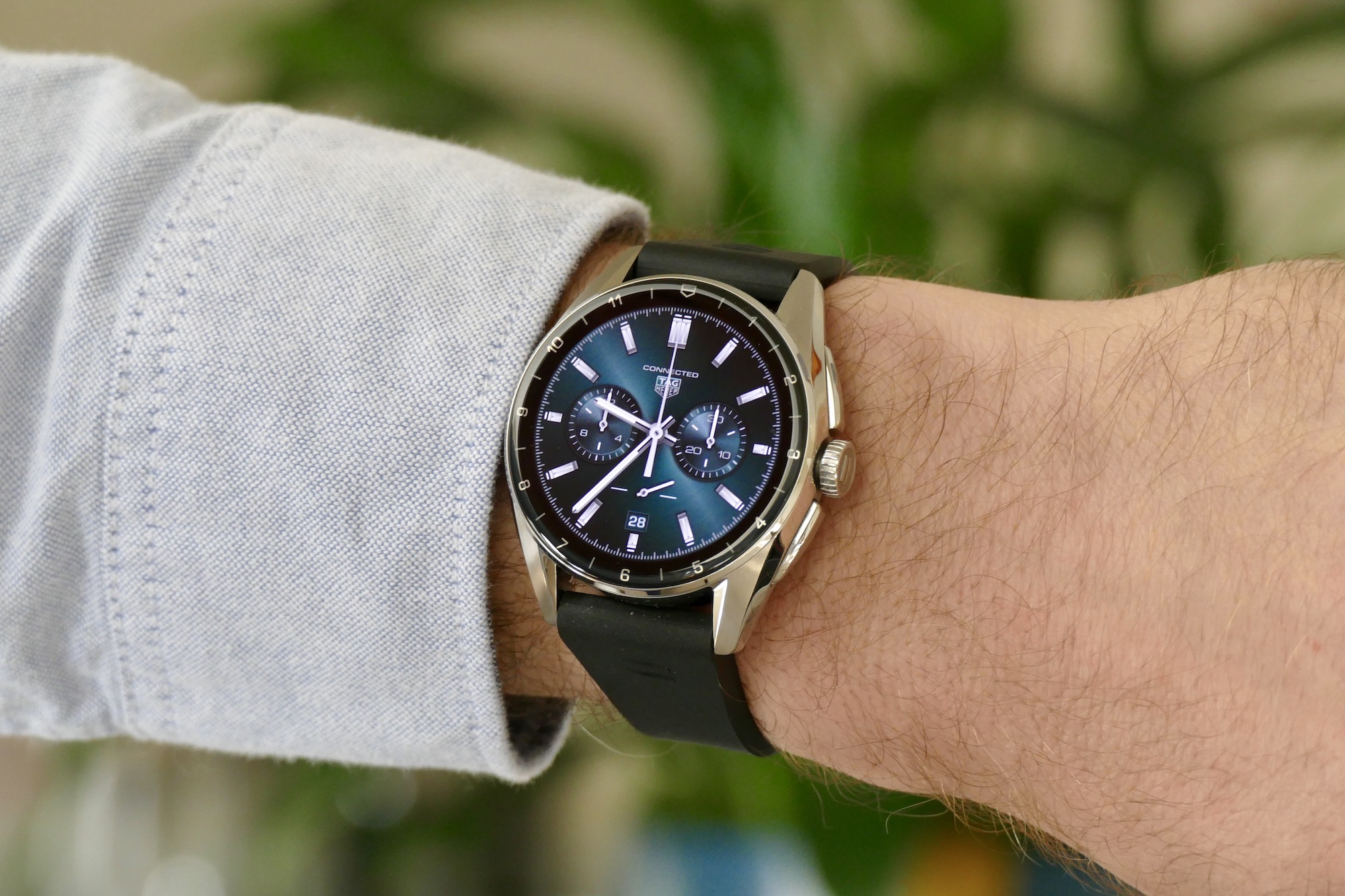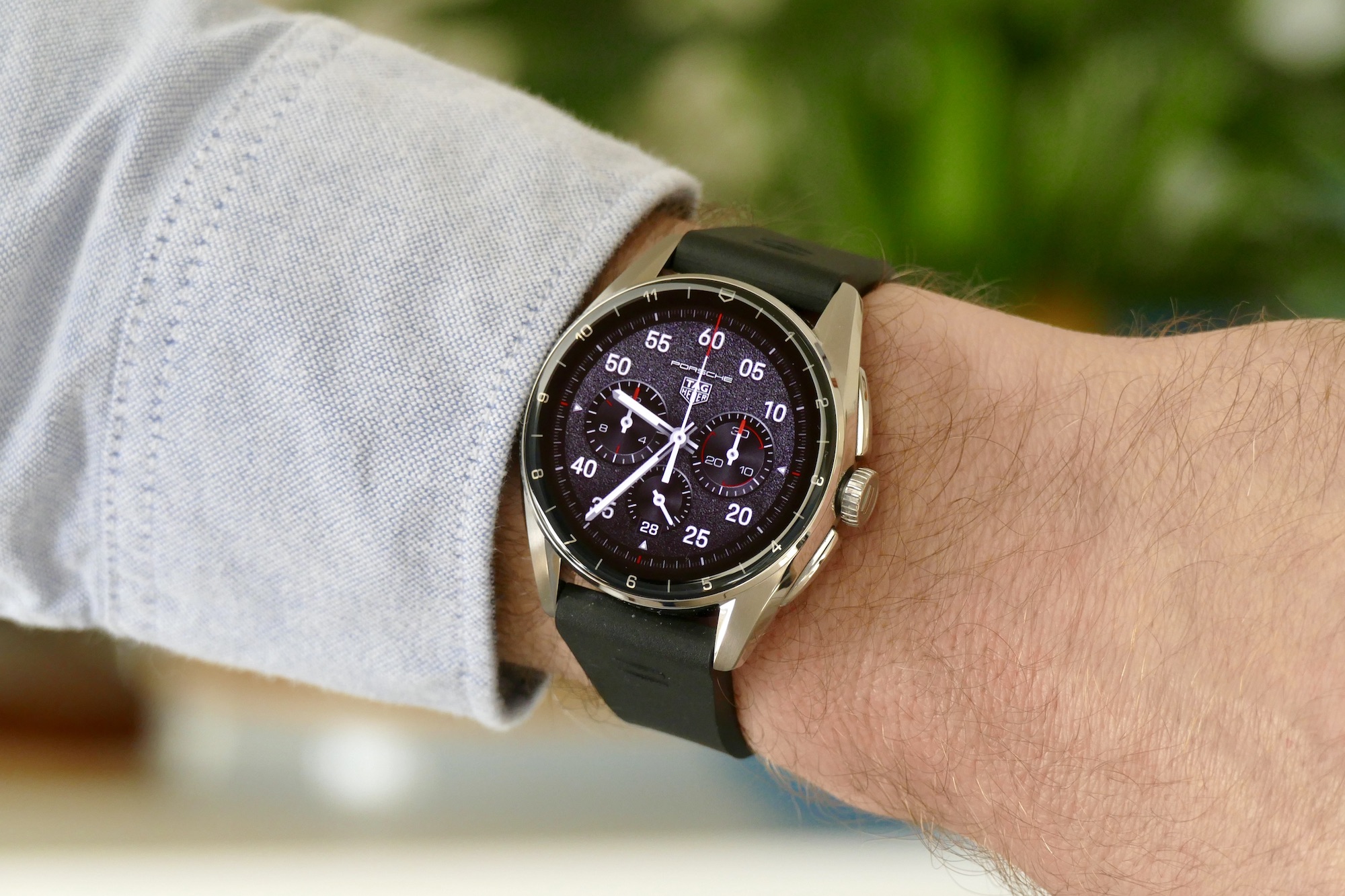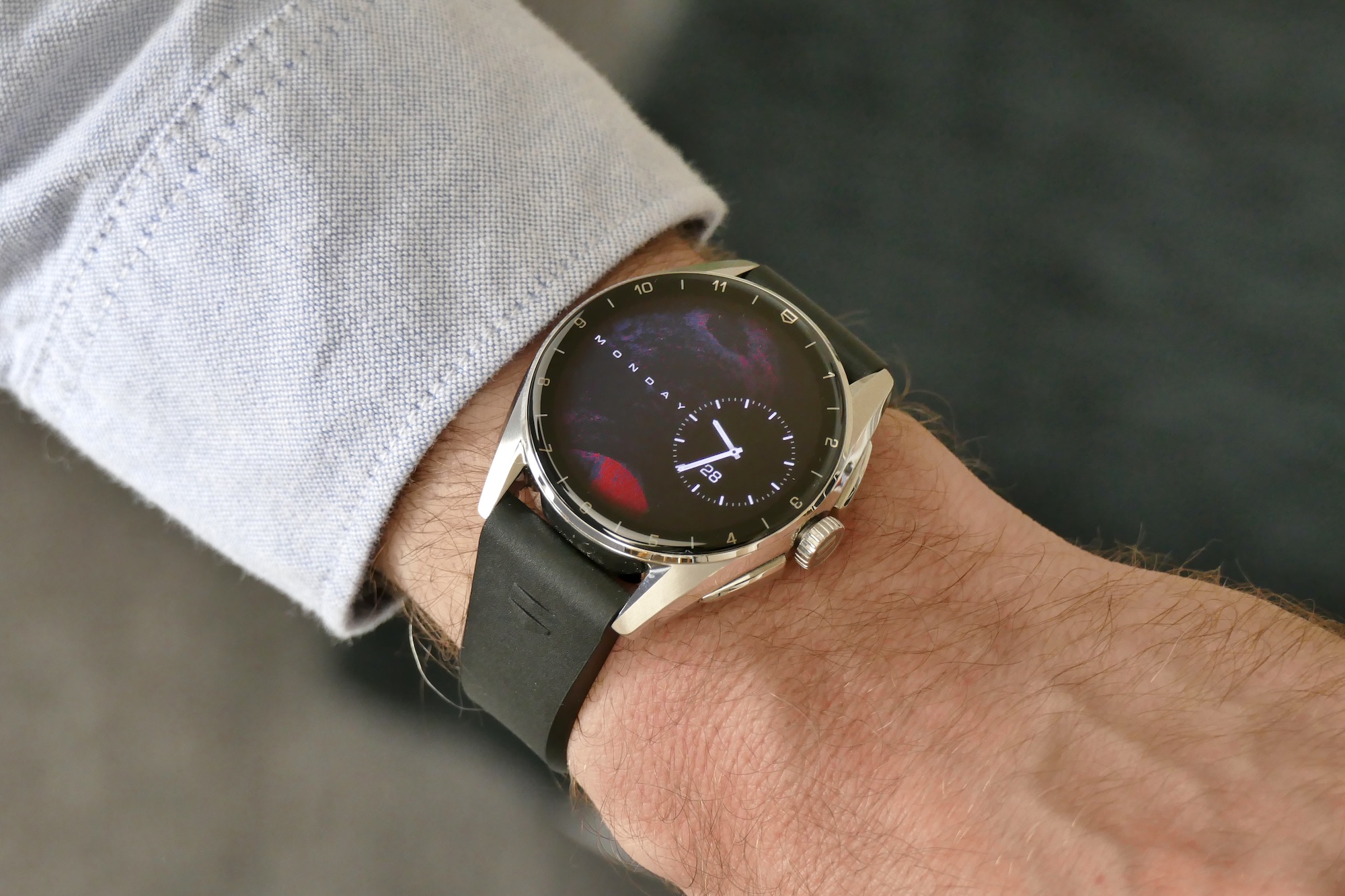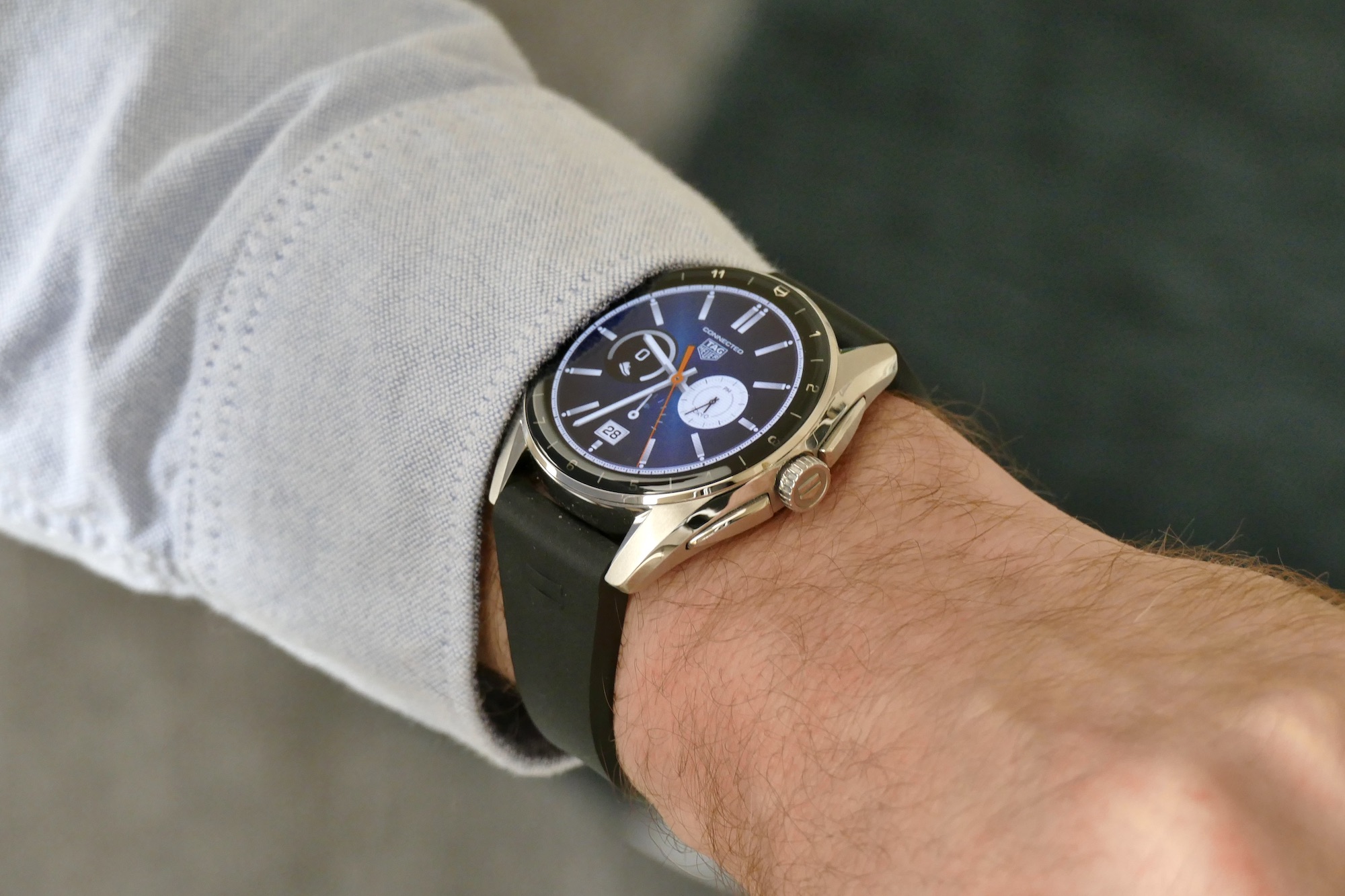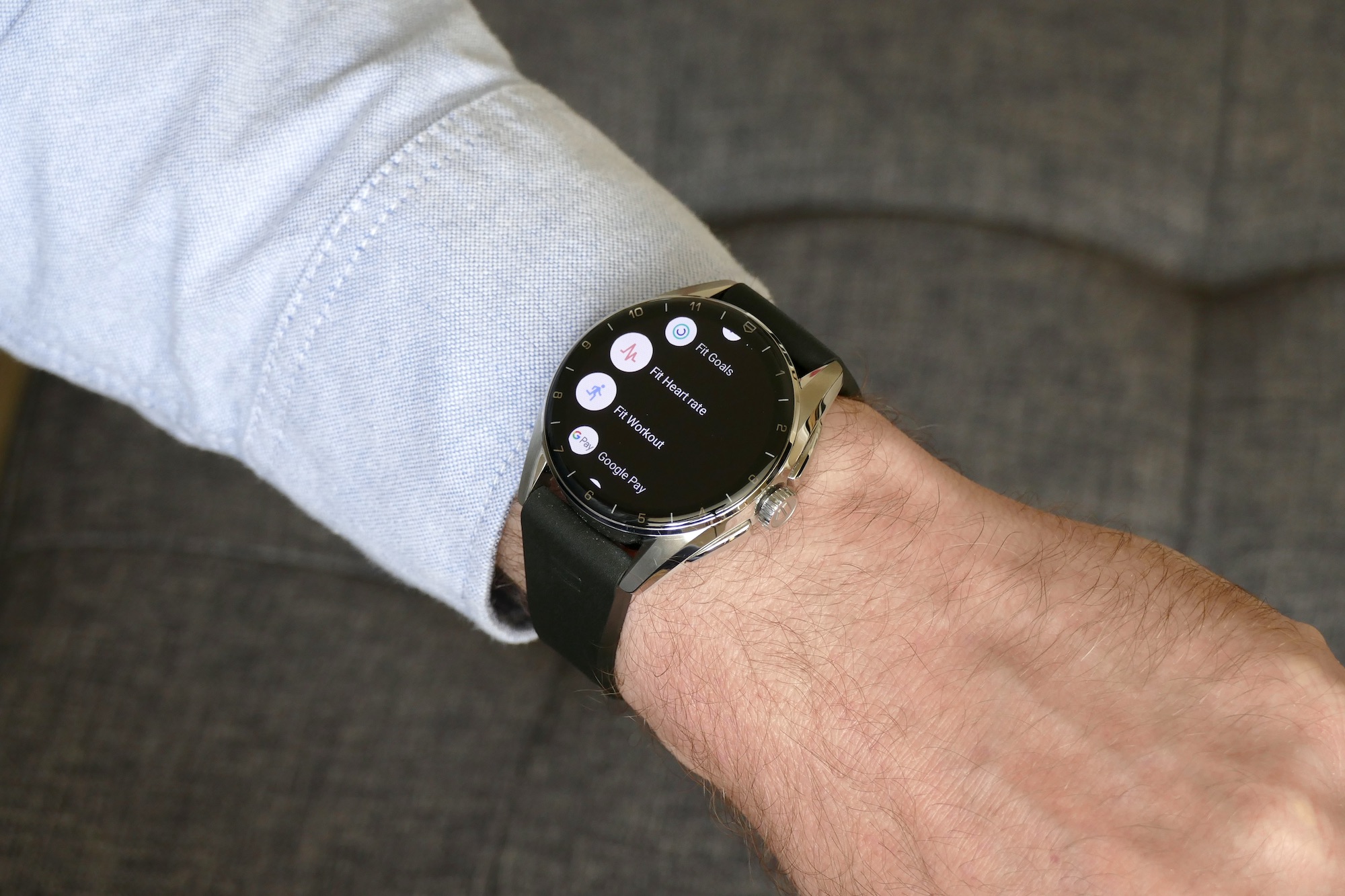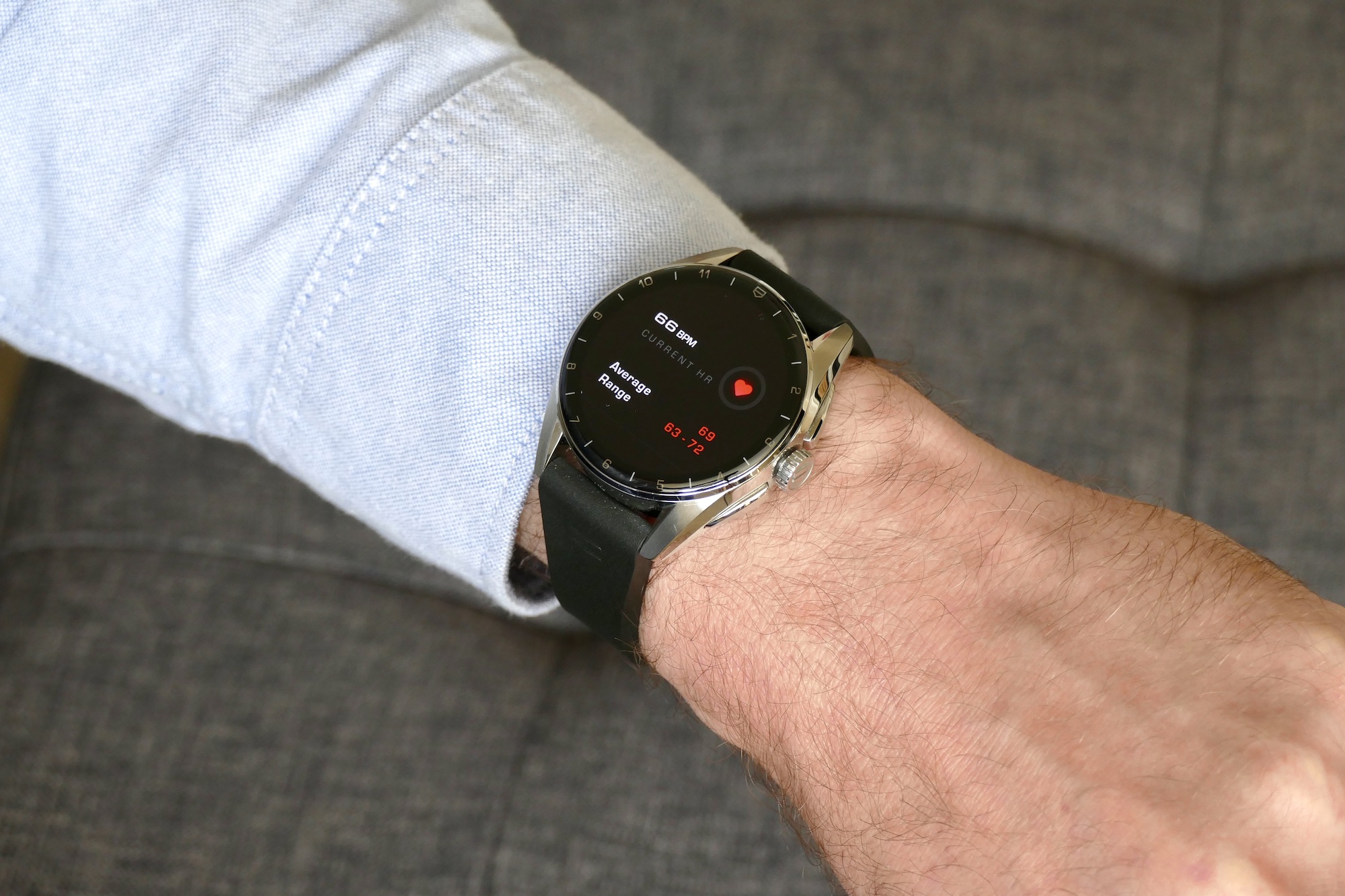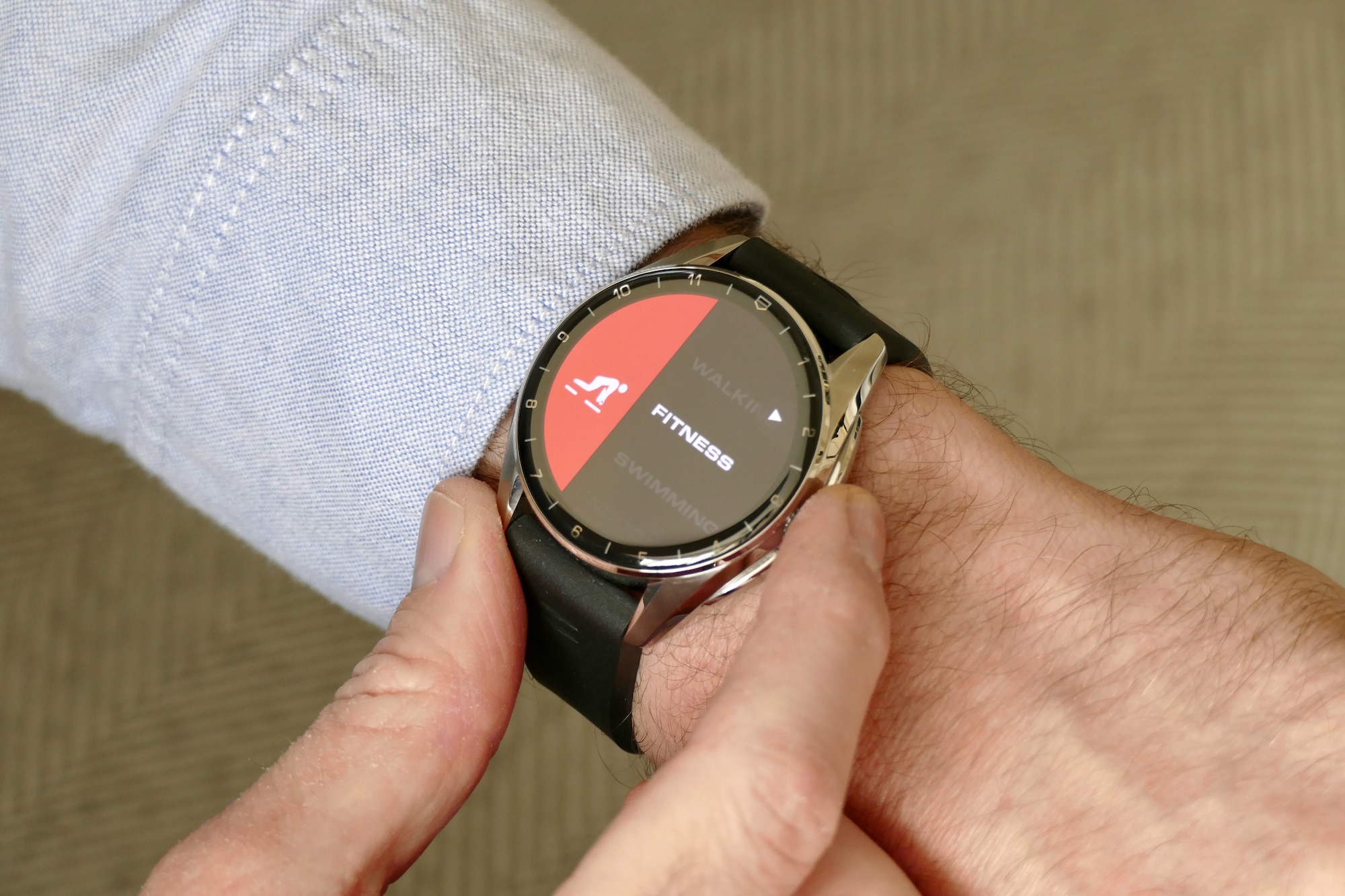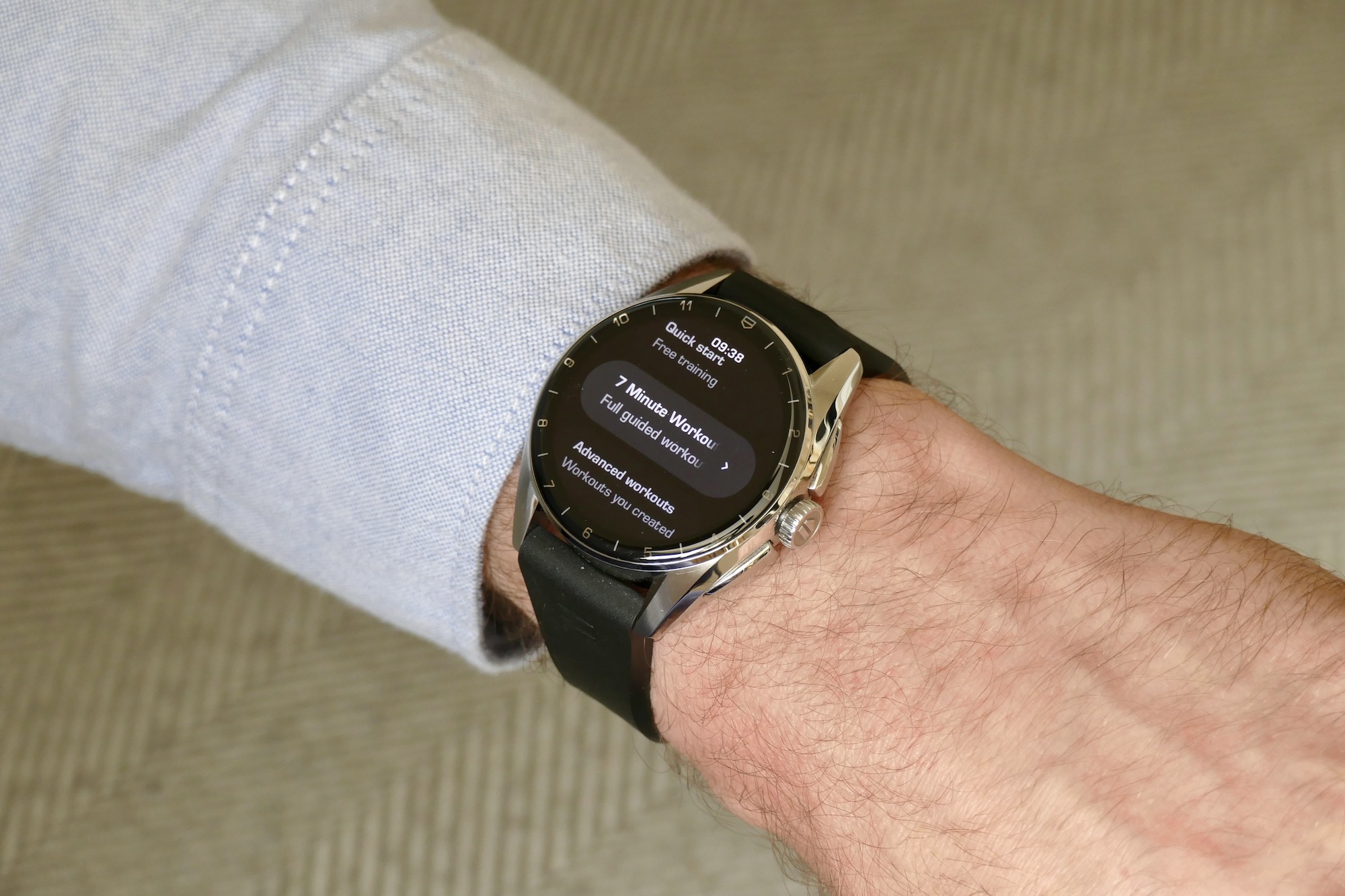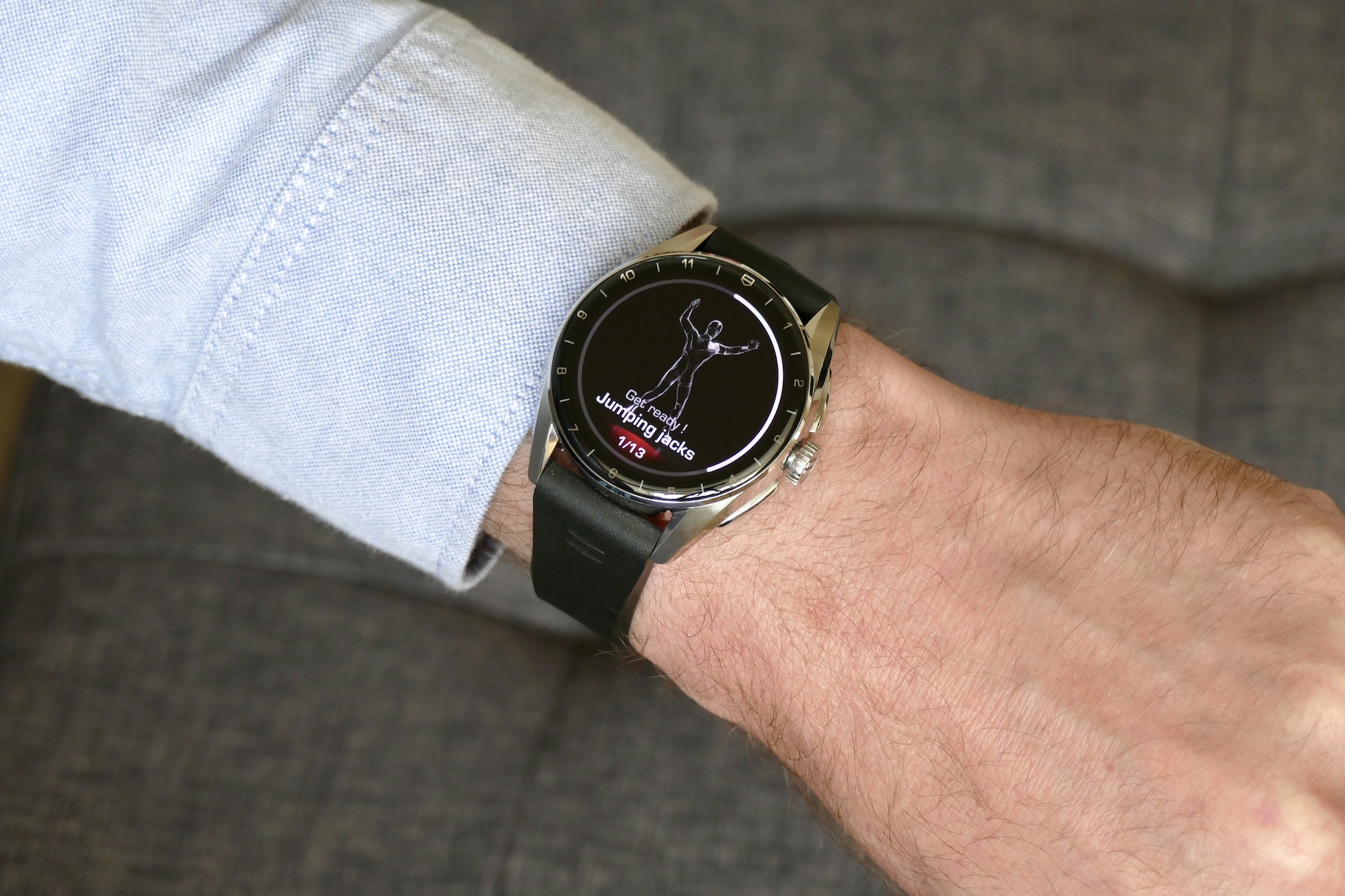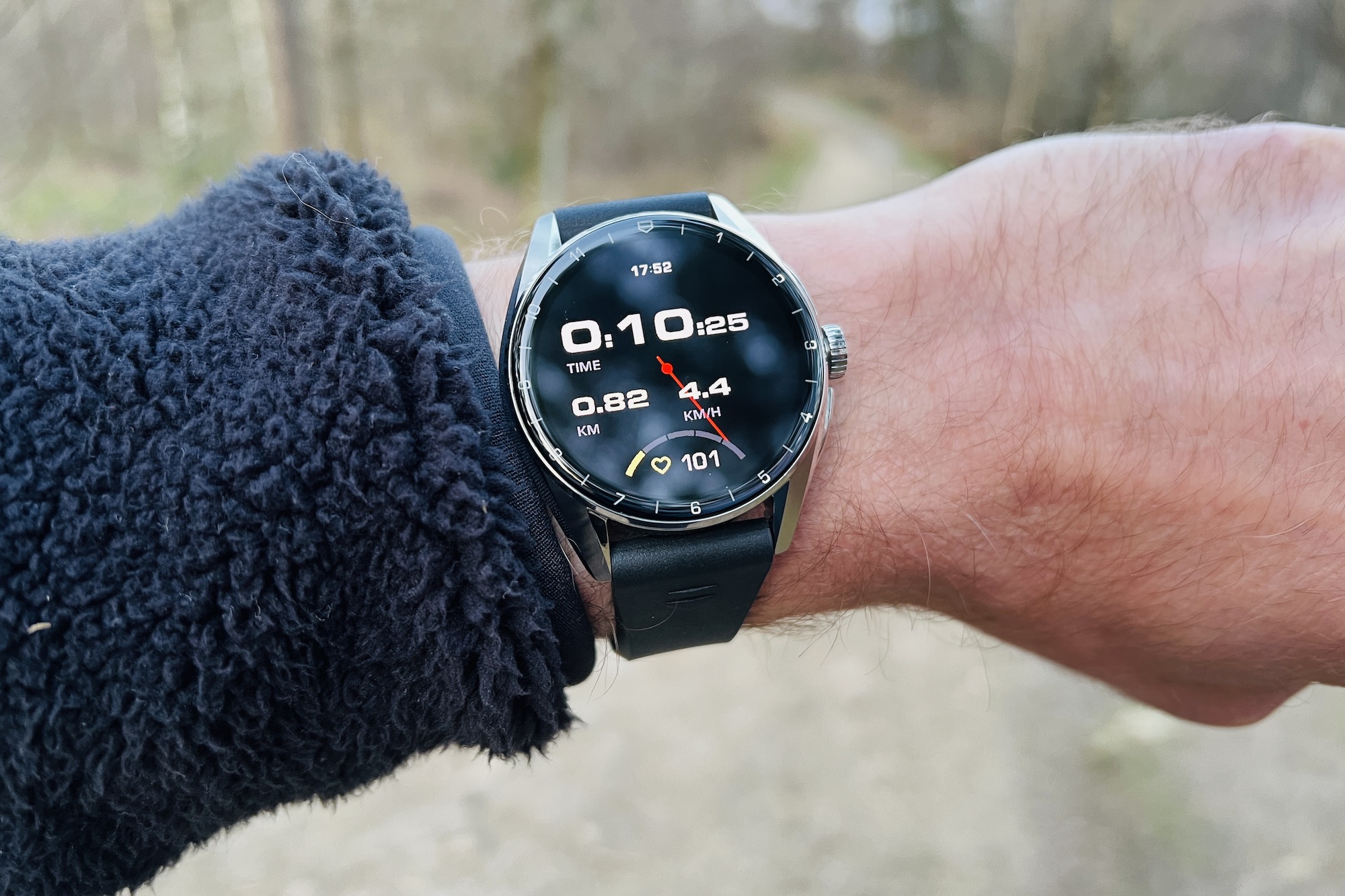“The Tag Heuer Connected Calibre E4 is as luxurious as you want, and has just the right amount of technical ability to make it a highly desirable smartwatch you'll want to wear.”
- Tag Heuer Sports app is excellent
- Luxury sapphire, ceramic, and steel build
- Sharp, high-resolution screen
- 42mm size suitable for most people
- No Sp02 sensor
- Can't take calls
If I’m splurging on a Tag Heuer watch, smart or otherwise, I want it to feel pretty special on my wrist. Its Connected Calibre E4 42mm costs $1,800 and doesn’t do anything an Apple Watch or Galaxy Watch can’t do. In fact, it does less, so I absolutely better feel something amazing when it’s on my wrist. Over the last 10 days, I’ve found out what it’s like to wear.
Design
Before anything else, you should understand Tag Heuer’s new smartwatch range. There are two models, the 42mm Connected Calibre E4 you see in our photos and that I’m reviewing here, plus a 45mm version with the same technology but a slightly different design. Following the single 45mm Connected Calibre E3, the choice of 42mm and 45mm models in the Calibre E4 range is very welcome, and slimming the case down to 13.9mm makes it more wearable. However, there’s no change in materials used — it’s stainless steel with a ceramic bezel — and there’s no titanium option for the E4 either.

I’ve yet to wear the 45mm model, but based on previous experience and wearing the 42mm version this time, I’m confident that, again, the smaller smartwatch is the one that will suit most people. The smaller 1.28-inch screen is just right, it fits under shirt cuffs, the curved sapphire crystal over it looks glorious, and the streamlined pushers and simple crown give it a seriously sophisticated look. For reference, it’s on my 6.5-inch wrist in the photos.
I showed it to a friend who doesn’t like the size and weight of most current smartwatches. He liked this one a lot, and said the shape, size, and design was the most appealing he’d seen. It’s exactly the kind of reaction you want. With the right watch face, it has the classic Tag Heuer look too, but is never over the top, or worse, cheap-looking. The super-sharp, very bright 416 x 416 pixel screen definitively makes the most of the various Tag Heuer watch faces.

The 42mm Connected Calibre E4 has a polished stainless steel case and is attached to either a steel, rubber, or leather strap. The rubber one on my review model is comfortable but can get a little sweaty, and it hasn’t got much “give” either, so I’ve had to wear it quite tightly or it tends to not sit squarely on my wrist. I love the folding clasp though, which is easily adjusted and really does look cool. It’s such a recognizable design and helps identify the smartwatch as one made by Tag Heuer. If you don’t like the strap, or want a few alternatives, Tag Heuer sells a variety of compatible straps for the Calibre E4 starting at $200.
The pushers have a very mechanical feel to them, adding a quality feel, and the rotating crown helps you navigate through the watch’s menus with speed and precision. The bezel incorporates hour markings and the Tag Heuer insignia, and because it’s set under the crystal, it doesn’t affect touchscreen use.

The Connected Calibre E4 is luxurious, elegant, and expertly built, with an awareness of what makes a good smartwatch without losing sight of what makes a Tag Heuer watch desirable. But did I feel different? The Tag Heuer name has cachet it’s supremely comfortable due to its spot-on size, and the sapphire crystal is warm and inviting to touch. I love the way it looks, and I like the way it makes me feel from the moment I close that iconic clasp on the strap.
Connects to iOS and Android
For the first half of my time with the Calibre E4, I used it with the iPhone 13 Pro. I’m pleased to say it automatically reconnected to the iPhone without any input from me, regardless of whether I had turned the watch off overnight or gone out of range. That made it easy and effortless to live with, just like the Apple Watch, and doesn’t always happen with smartwatches other than Apple’s own.
However, connected to iOS. it’s a little basic. Notifications arrive, but you can’t interact with any of them. There’s no replying to emails, liking a tweet, or sending a quick response to a message for example. However, there’s access to Google Play for apps, you can use Google Fit, and the Tag Heuer app available through Apple’s App Store is very attractive and feature-packed. However, you also need Google’s Wear OS installed on your iPhone, so it’s fairly app-intensive.
I have been satisfied with the reliability of the watch connected to iOS, but have missed the deep integration that comes with the Apple Watch and its wealth of excellent preinstalled apps and features. You don’t have an automatic handwashing timer, noise level alerts, or fall detection either, so the Calibre E4 feels quite restrained in comparison. However, the experience has definitely improved over the years, and if you’re happy with relatively basic functionality, it’s acceptable.
After using the smartwatch with an iPhone, I swapped to using it with an Android phone. Google has simplified the setup process and it takes only a few minutes for the smartwatch to get up and running. In addition to requiring Wear OS, the smartwatch also benefits from Tag Heuer’s own app being installed.
You can do a lot more on the Connected Calibre E4 when it’s connected to an Android phone. Notifications are interactive, with options to reply, delete or archive emails, like or retweet tweets, or send a canned response to messages. When connected to an iPhone, you are forced to always reach for your phone to do anything, but you can manage many tasks on the smartwatch when it’s connected to Android. It makes it more useful and convenient.
The reliability of notification arrival has been moderate regardless of which phone it was connected to, with some notifications arriving, some not, and some appearing in the notification list but without an alert. Despite having the haptic vibration alert set to its “Long” option, it’s still very easy to miss the subtle vibration the Calibre E4 makes.
Activity tracking
The Tag Heuer Connected Calibre E4 uses Google Fit or Tag Heuer’s own Sports app to track your activity and workouts. For this review, I’ve concentrated on the Tag Heuer Sports app because it’s not only a lot prettier than Google Fit, but it has some cool additional features and suited my needs equally as well.
By default, Tag Heuer Sports is assigned to the upper pusher on the case, and it tracks running, walking, golf, swimming, cycling, and general fitness activities. It’s quick to start, data is presented clearly, and interacting with the app is easy due to it using the pushers on the case rather than only the touchscreen. It also has an animated workout plan suitable for people of all fitness levels to follow.

Heart rate, calories, duration, and fitness zones are all measured, and the app provides an estimated rest time on its results page. When it tracks a walk or run, GPS activates without a problem and the app shows a map, as well as adds speed and splits data. The Calibre E4 also features Tag Heuer’s extensive Golf app, which debuted on the Modular 45 Golf Edition in 2019. All the data is stored in the app and it carried over between iOS and Android even when I reset the watch, which may be helpful for those who regularly swap phones.
Tracking walks and general fitness activities alongside the Apple Watch Series 7 revealed some discrepancies in heart rate. The Tag Heuer Connected Calibre E4 consistently undercounts heart rate compared to the Apple Watch, with most activities recording an average of 20 beats per minute lower. Neither are medical devices, but in previous experience, most devices match the Apple Watch’s heart rate data, indicating the Calibre E4 may require further calibration through a software update. The lower heart rate impacts calorie burn too.
One other thing that may affect heart rate accuracy is the watch’s strap. It’s not really designed for quick adjustment, and getting it tight enough on your wrist to increase the heart rate monitor’s contact with your skin takes trial and error. It needs to be very tight to stay secure. The Calibre E4 does not measure blood oxygen or take an electrocardiogram (ECG) reading.
If you want to track casual exercise — a few workouts, everyday steps, and maybe a round of golf — the Calibre E4 is great. The lack of a truly comprehensive sensor array means it’s not really for those who want serious insight, absolute accuracy, or a massive range of different workouts to monitor. Tag Heuer should be congratulated for the Sports app though, as it looks superb on both the watch and the phone, and has performed brilliantly too.
Software and performance
I have had no problem with the Calibre E4’s performance. It uses the Qualcomm Snapdragon 4100+ processor with Google’s Wear OS version 2.34, and it runs smoothly throughout. Apps load quickly, payments with Google Pay are simple, and acquiring GPS when exercising takes just a few seconds. Tag Heuer promises the Connected Calibre E4 will get an update to Wear OS 3 when it’s released later this year, but has not given a time frame for it yet.
Unfortunately, there’s no ability to take calls on the smartwatch, even with Bluetooth headphones connected. I received incoming call notifications, but when you tap to accept, it tells you to take the call on your phone.
Accessing Google Play is simple and there are various apps to download and install. I used YouTube Music (which incidentally took ages to download when connected to iOS, but just moments when connected to Android), where you can download songs and playlists to listen to over headphones without your phone connected. It also worked without any problem, and even downloading music was fast.
Battery and charging
Using the wireless charging stand supplied with the watch, it takes 30 minutes to reach about 50%, and about 70 minutes to fully charge. The stand has a glowing Tag Heuer logo on the front and the watch is secured to it with magnets that are more than strong enough to hold it in place. It’s suitably angled to be used by your bed and the watch’s display is in ambient mode by default.

Provided I turned the smartwatch off overnight — between about midnight and 8 a.m. — the battery would last two working days with one 45-minute workout tracked without GPS. With GPS active for a workout, a recommendation to enter battery-saving mode would arrive in the late evening on the second day as the battery hit 10% remaining.
I’ve had around 10 days using the Calibre E4 in total, so I haven’t been able to understand the battery life on a long-term basis, but I did notice it lasted slightly longer connected to the iPhone than it did an Android phone. Overall, the battery life isn’t outstanding, but it’s similar to most other Android smartwatches today.
Price and availability
The version in our photos is the cheapest available. It’s the Connected Calibre E4 42mm with a rubber strap, and it costs $1,800, or 1,500 British pounds. There are two other models available, one with a leather strap for $1,900, or 1,550 pounds, and another with a metal bracelet for $2,000, or 1,650 pounds. They are ready to purchase through Tag Heuer’s online store, its boutiques, and other partners now.
Our take
Every conversation about the Tag Heuer Connected Calibre E4 really has to start with the price. It’s four or five times the cost of a “normal” smartwatch, yet on a functional and technical level, it’s either basically the same or significantly less capable depending on what model you put it up against. This means if you’re driven by value or functionality, the Calibre E4 is never, ever going to make sense.
So it needs to really tug at your heart strings in the same way a non-smart Tag Heuer watch does. It’s really beautifully made, I love the classy design, the watch faces look excellent on the screen and under the sapphire crystal, and the Tag Heuer branding is visible but subtle. There is certainly an air of luxury about it, and I felt suitably special when it’s on my wrist, compared to when I’m wearing a Samsung Galaxy Watch 4 or even an Apple Watch.
However, because the tech side isn’t anything special, I’d probably get as much, if not more, personal satisfaction from wearing a $2,000 non-smart Tag Heuer Formula One or Aquaracer watch. If you’re planning to buy and own one watch, the Calibre E4 is hard to recommend due to all this. Except I can’t imagine anyone with the budget to buy a Calibre E4 doesn’t already own a non-smart Tag Heuer or other luxury Swiss watch, and that changes things.
The Calibre E4 is the ideal smartwatch to go alongside another watch. It ticks the right luxury boxes, it has the right tech inside, and the activity-tracking features are best suited to casual use. You wear it when you need to be better connected or when exercising, and swap to the non-smart watch when you don’t.
Is there a better alternative?
Yes. If you want a smartwatch that has superior technology and activity tracking, there are two great alternatives. If you own an iPhone, the Apple Watch Series 7 is your best bet, while if you own an Android phon,e the Samsung Galaxy Watch 4 or Watch 4 Classic should be at the top of your list. Both have better health-tracking features, the ability to take calls and more, and the Galaxy Watch 4 runs the very latest version of Wear OS already. They also cost around $400.
If you want a luxury smartwatch, there’s a surprising amount of choice out there. The Hublot Big Bang e is even more expensive — and more visually exciting — than the Calibre E4. If flamboyance is what you’re after, then there’s the Louis Vuitton Tambour Horizon (a crazy non-Wear OS smartwatch for $3,500), or you could even look at older models like the Porsche Design Huawei Watch GT 2, the Garmin Marq collection, or the Montblanc Summit 2+. Don’t forget the Hermés Apple Watch either.
What’s interesting is the Calibre E4 is better than them all due to it using the latest processor, being in line to get the big Wear OS update, looking excellent, and being quite reasonably priced when put up against the Hublot and Louis Vuitton watches.
How long will it last?
The Tag Heuer Connected Calibre E4 is made of stainless steel and has scratch-resistant sapphire crystal over the screen, plus it’s water resistant to 50 meters. The strap can also be replaced if it breaks. It certainly should be relatively hardwearing. The promise of an update to Google’s Wear OS 3 gives it additional longevity, but there’s no indication when the update will arrive, meaning you may have to wait until the end of this year or even beyond. It’s reasonable to expect two years of use out of the smartwatch, but as time goes on, the battery may hold less of a charge.
Should you buy one?
No. But equally, you shouldn’t buy any luxury product because they are rarely good value. If price and value are unimportant and you want a competent luxury smartwatch, then the Tag Heuer Connected Calibre E4 is the best current option.

